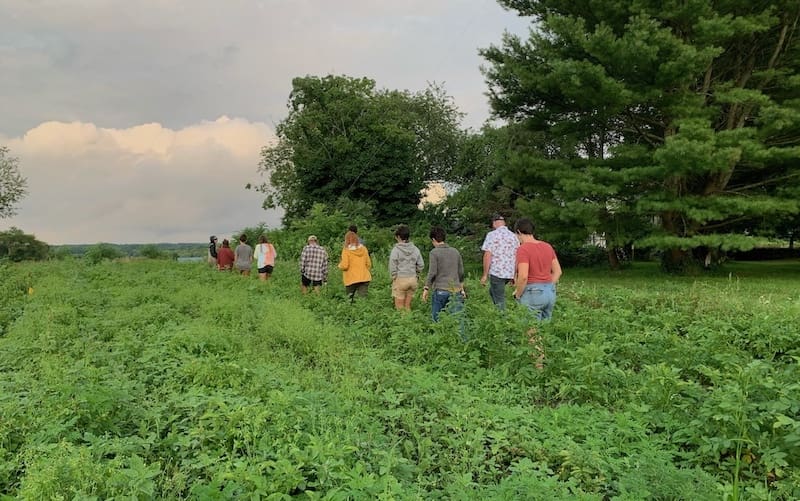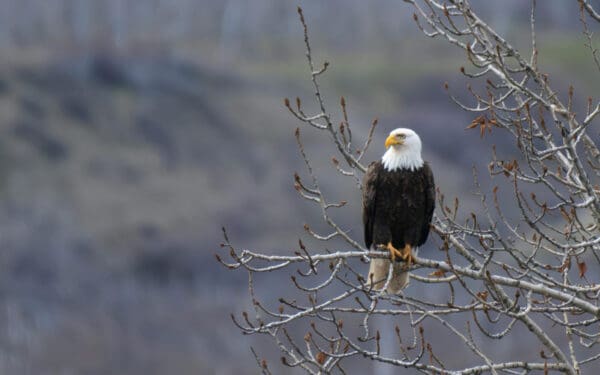
Trump's cuts to "equity-related" grants have put local farmers and the organizations that support them at risk, with consequences for our food system. Photo: Francesca Gallo
In May, Sara Churgin received devastating news that made her want to cry. The head of the Eastern Rhode Island Conservation District got word that the Environmental Protection Agency was terminating her nonprofit’s funding. The reason? Its mission was “no longer consistent with EPA funding priorities.” The cut meant Churgin’s organization would lose a stunning $300,000 over the next three years, making Churgin feel as if her organization had been “cut off at the knees.”
The Conservation District was established in response to the Dust Bowl of the 1930s, when farmers struggled with widespread soil erosion and crop failures. Since then, its mission has been to educate and assist farmers through climate changes. But because the organization had received its grant funding under the Inflation Reduction Act, it ended up on the Trump administration’s hit list targeting climate-smart practices and “equity-related” grants.
Since January, the Trump administration has rescinded many grants supporting farmers of color and sustainable farming practices. This short-sighted move threatens to make our food system even more unfair than it already is, potentially limiting access to sustainably grown local food at a time when consumers are already complaining about high grocery prices. But the cuts aren’t just anti-climate and anti-equity. They’re anti-farmer. The administration’s reckless policies undermine our ability to feed ourselves by hobbling the sustainable farmers we rely on, increasing dependence on less sustainable food imported from outside New England.
A Lost Opportunity to Fight Climate Change
For Churgin, the grant cuts have put one of her organization’s most important projects at risk: establishing the first statewide food waste diversion program in Rhode Island. Food waste diversion is the practice of redirecting food waste from landfills and using it for more sustainable purposes, such as compost, animal feed, or energy-rich biogas. Food waste diversion could help Rhode Island farmers save money while protecting the environment by utilizing what is usually wasted to enrich their fields and feed their livestock.
The Conservation District has already organized the land deal for the project and established the required partnerships. However, the District was relying on the grant to fund the design, installation, and operation of the first municipal compost site in Rhode Island, as well as a compost education program. The program fell victim to the Trump administration, which has gutted federal climate efforts and frequently criticized climate justice programs as “woke DEI propaganda.”
By slashing funding for sustainable practices, like composting, no-till agriculture, and cover cropping, the Trump administration is denying farmers the opportunity to contribute to solving climate change. This is especially important because food production is responsible for about 26% of global greenhouse gas emissions. As a result, not only will we see the pace of climate change quicken, but our food crops will be increasingly vulnerable to drought, floods, and other extreme weather fueled by climate change.
Furthermore, farmers of color will face even more barriers to accessing farmland and funding than they already do as the administration seeks to terminate all DEI programs as “illegal and immoral.” Additionally, organizations that support farms and could help manage the impacts of climate change, such as the Conservation District, will have to close or significantly reduce operations. This will set our food system back years in terms of sustainability and cause irreparable harm to the food system as a whole.
Helping Farmers Overcome Federal Barriers
When Churgin learned about cuts to her organization’s funding, she contacted CLF’s Legal Food Hub. Churgin knew the Hub is a free service that connects eligible farmers, food entrepreneurs, and food-related organizations to volunteer attorneys. The Conservation District had been a recipient of pro bono support through the Hub before, so Churgin thought the Hub’s ability to assist with a variety of legal issues made it a perfect resource to fight grant cuts by the Trump administration. And Churgin was right. CLF had been tracking funding cuts and was prepared to help farmers, food entrepreneurs, and food nonprofits navigate the fallout.
CLF has responded by using the Hub to do what it does best: mobilizing attorneys throughout New England to support farmers as they face the Trump administration’s reckless and harmful cuts. The Hub is prepared to connect those affected with lawyers to help navigate the National Appeals Division process and deal directly with funding cuts, sort through an unexpected bankruptcy, or find the right lawsuit to join.
Tapping into Legal Networks
When the funding chaos began, the Hub adapted quickly by tapping into a network of 42 New England attorneys who, for a time, met weekly to stay informed and to volunteer as needed. To further ensure the Hub is prepared, CLF partnered with a national coalition of legal advocacy that also meets weekly. The coalition is composed of organizations like Earthjustice, Farmers Legal Action Group, National Sustainable Agriculture Coalition, and Southern Environmental Law Center. The group works to coordinate litigation efforts, identify individuals affected by the grant cuts who are interested in pursuing legal action, and disseminate the most accurate and up-to-date information to those impacted.
Further, the Hub is providing New England farmers and nonprofits with educational information on how to file appeals. The Hub has also recruited two senior fellows to help monitor Trump administration litigation and action. Although the Hub has never represented participants directly, we consider it essential, given the current situation, to help participants even if we are unable to find lawyers outside CLF willing to assist. Therefore, both senior fellows have been trained to assist participants in filing appeals at the federal level.
The Hub’s Work with Eastern Rhode Island Conservation District
The first step after Churgin’s call was for her to meet with Mary Rose Scozzafava, Hub senior fellow, to identify the complexities of the District’s issue and potential solutions. Scozzafava then spoke with the national coalition and was able to connect the District with an organization that was bringing a class action lawsuit challenging the termination of its grant. Although the District could not join the litigation for technical reasons, a successful outcome in the case would restore critical funding for the Conservation District. In addition, the District has had the opportunity to file documents with the court to support the litigation. In the meantime, the Hub remains committed to helping the District – whether that means dealing with contract issues caused by lost funds, providing educational materials for changing land use, or assisting with any other challenges that arise.
How Can You Take Action?
While Churgin and many others wait for the results of the lawsuits, there are actions we can all take to support those who make our food systems possible. We can keep the pressure on state legislators to support sound agricultural and climate policies that protect our food system and planet. We can also consider donating to our local Northeast Farming Association, joining a co-op that sources from local farmers, or purchasing food directly from farmers themselves. We require a diverse group of farmers working sustainably to attain a fair food system capable of feeding our families for generations to come. We cannot allow myopic, regressive policies to jeopardize the health of our food system.
Stephen Hoare is a J.D. Candidate at Suffolk University Law School in Boston. This summer, he interned with CLF’s Farm and Food Initiative as a Civil Action Project Fellow.



